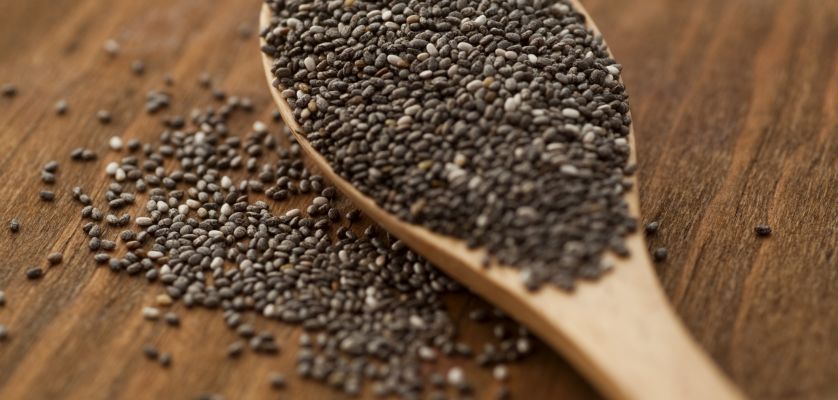In this article I want to talk about the benefits of chia seeds, but also about the dose of chia seeds that can be taken per day. Read on and discover one of the best superfoods that nature has given us.
Recommended daily dose of chia seeds
In adults , the recommended daily dose of chia seeds is 13 to 15 grams. A few tablespoons 2.
For children (over 6 years) and young people up to 16 years do not exceed one tablespoon a day, about 6 grams maximum per day.
And indeed, chia seeds are one of the healthiest foods, they are loaded with nutrients that have important benefits for the body and brain; to convince you to include them as part of your daily diet, here are 10 health benefits of chia seeds that are supported by studies in humans.
You may be interested in: 5 superfoods that improve your health and sports performance.
1. Chia seeds provide a large amount of nutrients with very few calories.
Chia seeds are small black seeds that come from the plant called Salvia Hispanica, this plant grows naturally in America, there are records that Chia seeds were an important food in the diet of the Aztecs and the Mayas, they valued this seed for the ability it had to provide energy, in fact the word "Chia" is an ancient Mayan word that means "strength".
Beyond the ancestral history of these seeds, they are now recognized as a superfood, in recent years their popularity has grown and they are consumed worldwide by health conscious people.
At a nutritional level 28 grams of chia seeds contain: 11 grams of fiber, 4 grams of protein, 9 grams of fat. In addition 18% of the recommended daily allowance of calcium, 30% of the recommended daily allowance of manganese, 30% of the recommended daily allowance of magnesium and 27% of the recommended daily allowance of phosphorus. In addition, these small seeds contain Zinc, Vitamin B3, Potassium, Vitamin B1 and Vitamin B2.
This serving of chia provides only 137 calories, making chia seeds one of the best sources of nutrients calorie for calorie, plus they are whole grains that are regularly grown organically, non-GMO and naturally gluten free.
2. Chia seeds are loaded with antioxidants.
Antioxidants, another area in which chia seeds excel, the antioxidants in chia seeds are intended to protect the fatty acids that the seed possesses and prevent them from going rancid, antioxidants are of great importance as they protect the body against free radicals.
3. Almost all the carbohydrates in chia seeds are fiber.
If you go through the list of nutrients in chia seeds you will notice that out of 28 grams, 12 grams are carbohydrates, but 11 of those grams are fiber which is not digested by the body, does not raise blood sugar and does not require insulin to be eliminated from the body so it does not count as a carbohydrate.
The true carbohydrate content is only 1 gram, which makes chia a low carbohydrate friendly food. Thanks to all the fiber that chia seeds possess they can gain 10 to 12 times their weight in water, when they reach the stomach they turn into something similar to jelly. Theoretically it is considered that this can help satiety, helping to consume fewer calories.
Fiber also feeds the friendly bacteria that live in the intestine, which is very important for health. Chia seeds are 40% fiber, making them one of the best sources of fiber in the world.
4. Chia seeds have high quality protein.
Chia seeds contain a pretty decent amount of protein, 14% of its weight is made up of high quality protein, it also contains a good amount of essential amino acids so the body will be able to utilize the protein it contains.
Protein has many health benefits, it is by far the friendliest nutrient in the process of following a weight loss regimen. A high protein intake reduces appetite and has been shown to reduce obsessive thoughts about food by 60 and nighttime cravings by 50%. If people consume little or no animal protein chia seeds are an excellent source of protein.
5. Due to the high fiber and protein content, chia seeds may be able to aid in weight loss.
Many health experts believe that chia seeds may help with weight loss. The fiber absorbs large amounts of water and expands in the stomach, which should increase satiety and decrease the assimilation of food. Studies have been done with a similar fiber glucomannan, showing that it can lead to weight loss, so the protein in chia seeds may help reduce appetite and food intake.
But when studying the effects of chia on weight loss the results are not entirely encouraging, in a study of 90 overweight people, people added to their diet 50 grams of chia seeds per day for 12 weeks, this had no effect on body weight and health indicators. In another 10-week study with 63 women, chia seeds had no effect on weight loss but increased the percentage of Omega 3 in the blood.
Although adding only chia seeds to the diet may not seem to affect weight, they can be a useful addition, because losing weight is much more than adding or eliminating foods, the whole diet counts as much as other lifestyle activities such as sleep or exercise. If chia seeds are combined with a diet based on nutritious foods and a healthy lifestyle they will certainly be of great help in weight loss.
6. Chia seeds can improve some blood indices, which would help lower the risk of heart disease and type 2 diabetes.
Since Chia seeds are high in fiber, protein and omega 3, they should be able to improve metabolic health. This has been tested in many studies but no conclusive results have been obtained, some experiments have shown that chia seeds can lower triglycerides, raise good HDL cholesterol, reduce inflammation, insulin resistance and belly fat.
7. High levels of bone-friendly nutrients
Chia seeds have high levels of nutrients important for bone health, including calcium, phosphorus, magnesium and protein. The percentage of calcium is impressive, 18% of the recommended daily allowance is found in one ounce, this is much higher than most dairy products. Chia seeds can be considered an excellent source of calcium for people who do not consume dairy.
8. Chia seeds can cause significant improvements in Type 2 Diabetes.
The most successful application of chia seeds has been developed in patients with type 2 diabetes. In a study conducted with 20 diabetic patients, they received 37 grams of chia seeds or 37 grams of wheat bran for 12 weeks. When they analyzed the patients who consumed chia seeds, they saw important changes in health indicators, lowering blood pressure and other risk factors.
9. Chia seeds are easy to incorporate into the diet
Chia seeds are very easy to add to the diet, they can be added to almost anything, they do not need to be ground, they can be eaten raw, added to juices, soups, puddings and even in baked products.
They can be added on top of cereal or yogurt, in a salad or in preparations with rice, can be mixed with water and made into jelly, they are regularly well tolerated unless the person has problems with fiber intake. The recommended daily dose is 20 grams, about 1 and a half tablespoons twice a day.
10. Chia seeds can replace the consumption of eggs in some preparations.
This is due to the characteristic of the seeds that when mixed with water forms a gel. This can be used to replace eggs in order to obtain preparations with better cholesterol content and increase the nutrients in baked goods. To replace eggs, simply mix one tablespoon of chia seeds with 3 tablespoons of water and let stand for 15 minutes.
A final word
In summary, recent research has found that the benefits of chia seeds are unsurpassed by any other food, no doubt these seeds fully earn the title of "superfood". Chia seed's contributions to the health of the body include promoting healthy skin, reducing the signs of aging, supporting the heart and digestive system, building stronger bones and muscles. It has even been linked to the treatment and control of diabetes.
However, if you decide to incorporate it into your diet, it is best to do so gradually. Chia is high in fiber, so start with a small amount and be sure to drink plenty of water, start slowly and give your body time to adjust to the increased fiber intake.
Read more news about: Nutrition













